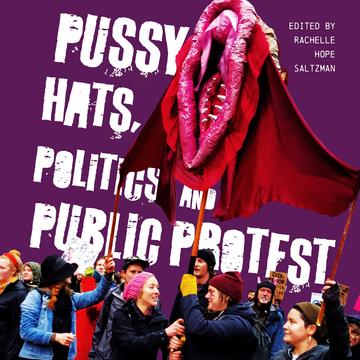
Pussy Hats, Politics, and Public Protest
A timely exploration of grassroots political protest in the age of Trump
Description
Co-winner of the 2021 Elli Köngäs-Maranda Prize awarded by the Women's Section of the American Folklore Society
Contributions by Susan Eleuterio, Andrea Glass, Rachelle Hope Saltzman, Jack Santino, Patricia E. Sawin, and Adam Zolkover
The 2016 US presidential campaign and its aftermath provoked an array of protests notable for their use of humor, puns, memes, and graphic language. During the campaign, a video surfaced of then-candidate Donald Trump’s lewd use of the word “pussy”; in response, many women have made the issue and the term central to the public debate about women’s bodies and their political, social, and economic rights. Focusing on the women-centered aspects of the protests that started with the 2017 Women’s March, Pussy Hats, Politics, and Public Protest deals with the very public nature of that surprising, grassroots spectacle and explores the relationship between the personal and the political in the protests.
Contributors to this edited collection use a folkloristic lens to engage with the signs, memes, handmade pussy hats, and other items of material culture that proliferated during the march and in subsequent public protests. Contributors explore how this march and others throughout history have employed the social critique functions and features of carnival to stage public protests; how different generations interacted and acted in the march; how perspectives on inclusion and citizenship influenced and motivated participation; how women-owned businesses and their dedicated patrons interacted with the election, the march, and subsequent protests; how popular belief affects actions and reactions, regardless of some objective notion of truth; and how traditionally female crafts and gifting behavior strengthened and united those involved in the march.
Reviews
"Pussy Hats, Politics, and Public Protest is a truly important and timely intervention that illustrates the many ways folklore scholarship can provide a valuable lens to understand politics and the public sphere. It will make a significant contribution to scholarship at the intersection of gender, politics, and folklore, as well as to conversations around kitchen tables, in neighborhood coffee shops, and in political forums."
- Christine L. Garlough, author of Desi Divas: Political Activism in South Asian American Cultural Performances
"Pussy Hats, Politics, and Public Protest is a necessary and compelling addition to folkloristics, the larger cultural conversation of the Trumpian era, and the critical ways in which creative expression is being employed in protests and, to a lesser degree, everyday life. This critically important work brings the conversation about festival, material culture, narrative, and other folkloric forms into the current political landscape in a profound and moving way."
- Elizabeth Adams, folklorist and associate vice president of undergraduate studies at California State University, Northridge
"This volume provides a much-needed contribution to our understanding of this important social movement, particularly with its analysis at the cross section of folklore and political science. Pussy Hats, Politics, and Public Protest would make a valuable addition to syllabi for political science, sociology, and folklore classes alike and is accessible to both a specialist and general audience."
- Jennifer Mansfield, Western Folklore
"Pussy Hats, Politics, and Public Protest’s most valuable contribution lies in its thoughtful documentation of this tumultuous time and place in the recent past. . . . Perhaps what most excites me about this volume is the idea that future readers will pick it up and experience the complexity of fresh emotions and analysis that its authors share, which unfold alongside vivid primary source images."
- Cristina Benedetti, Journal of American Folklore
"As a project of documentation, these accounts will become even more important as the Women’s March fades into historic memory, which will inevitably flatten our understanding of it. Perhaps what most excites me about this volume is the idea that future readers will pick it up and experience the complexity of fresh emotions and analysis that its authors share, which unfold alongside vivid primary source images."
- Cristina Benedetti, Journal of American Folklore